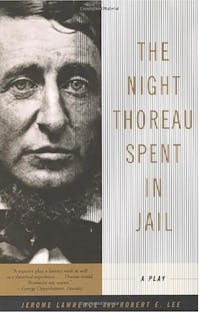The Night Thoreau Spent in Jail
A Play
 Download image
Download image
ISBN10: 0809012235
ISBN13: 9780809012237
Trade Paperback
112 Pages
$14.00
CA$19.00
The Night Thoreau Spent in Jail is a play in two acts, with several shifting and interpolated scenes from the real and imagined life of Henry David Thoreau (1817-62), the great nineteenth-century American author and poet-philosopher. The play is a dramatic representation of a vital moment in our history, in which the 29-year-old Thoreau's ardent refusal to pay taxes—in protest to the United States government's involvement in the Mexican War—landed him in prison in his home of Concord, Massachusetts.
This famous act of civil disobedience—daring and unprecedented though it was—is merely the point of departure for Jerome Lawrence and Robert E. Lee's widely celebrated drama. As the play progresses, we in the audience witness many if not most of the formative experiences in young Thoreau's life. We come to understand what motivates this brilliant, independent, and ever-unorthodox writer and thinker, what matters most and least to him in life and why. Perhaps most importantly, we are made privy to the inspiration and development of Thoreau's personal, natural, and influential philosophy.
That philosophy, known as transcendentalism, was an American creation of the middle 1800s that viewed all aspects of life, including human life, as small and inter-related parts of God, or the Universal Mind. Transcendentalism—originally, at least—was as much a literary movement as it was a philosophy, and it stressed individual choice and instinct above all other human impulses. Since the play carefully and candidly profiles the friendship between Henry David Thoreau and Ralph Waldo Emerson, it likewise profiles the friendship that, more than any other, fostered the development and dissemination of transcendentalist thought.
Written and first produced in the early 1970s, The Night Thoreau Spent in Jail can—and should—be read as a work of protest. As alluded to in the playwrights' introductory remarks, the many telling similarities between the Mexican War and the Vietnamese conflict are not coincidental. Indeed, Lawrence and Lee seem to view their protagonist as one who can speak with clarity and conviction to all generations of Americans, be they veterans of the Revolution or members of today's military. But the play, like the man it celebrates, is a work not only of protest but of enlightenment. Henry does the majority of speaking in this play, and whenever he speaks, and whatever he says, he is quite often addressing the audience. The task students have in reading this play is to discern Henry's message as well as his method—what Henry David Thoreau is trying to say to us and why (and how) he is saying it. By turns wise, funny, engrossing, and deeply sad, The Night Thoreau Spent in Jail is, as the playwrights assert in their Production Notes, "the ruminating of one man in one place in one night." Within these dramatic and far-reaching ruminations American students will recognize both their choices as human beings and dilemmas as members of society, both their history and reflection.
Reviews
Praise for The Night Thoreau Spent in Jail
"A superior play, a literary work as well as a theatrical experience. Thoreau would illuminate any season."—George Oppenheimer, Newsday
"Absolutely fascinating. The ingenuity of fitting the years together for a single night, the research skill which uncovered all these striking parallels and uses them so naturally, strikes me as imaginatively commanding."—Richard L. Coe, The Washington Post
"Thoreau's night in jail seems destined for an important place in the American theater. It combines the drama of Lawrence and Lee's most important previous work, Inherit the Wind, with the charm of their other best known play, Auntie Mame. The script is filled with humor, poignancy, and powerful drama."—St. Paul Dispatch
"Lawrence and Lee have produced their finest work."—London Financial Times
"The play must rank among the most brilliant intellectual stimulants of the 1970s, perhaps even of the twentieth century."—Columbus Dispatch
"There is a great deal to enjoy in this play."—Clive Barnes, The New York Times


